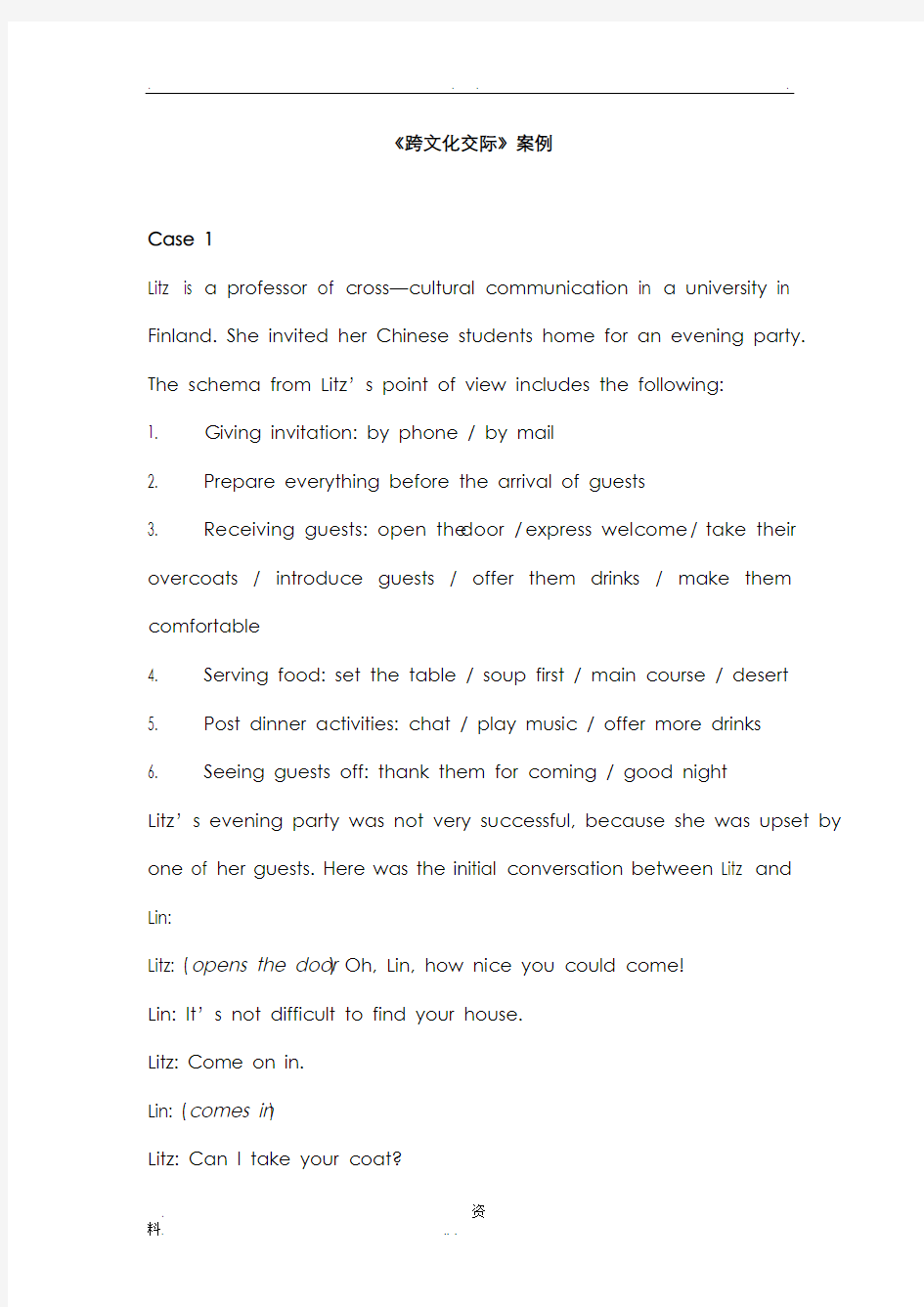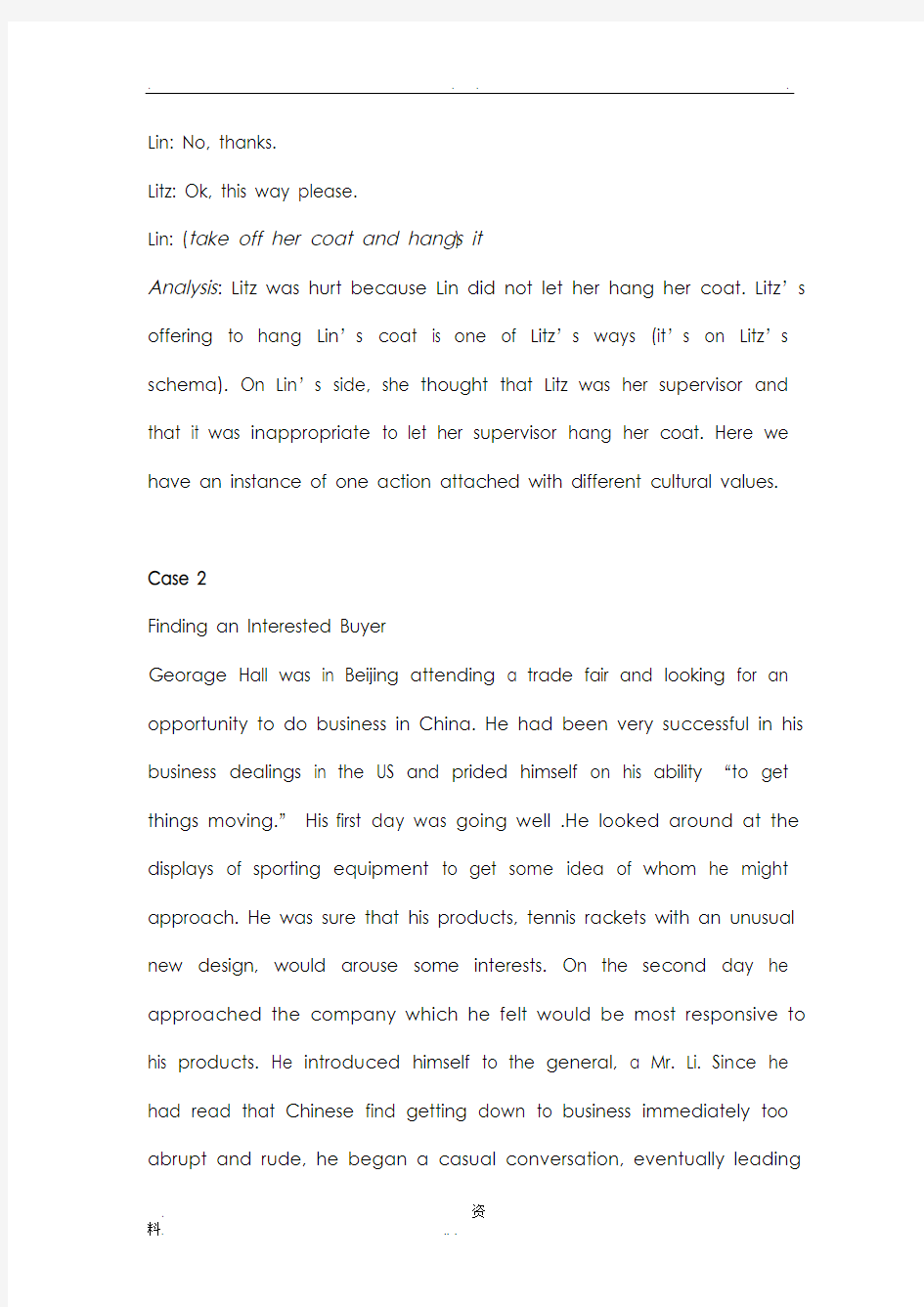跨文化交际案例


《跨文化交际》案例
Case 1
Litz is a professor of cross—cultural communication in a university in Finland. She invited her Chinese students home for an evening party. The schema from Litz’s point of view includes the following:
1. Giving invitation: by phone / by mail
2. Prepare everything before the arrival of guests
3. Receiving guests: open the door / express welcome / take their overcoats / introduce guests / offer them drinks / make them comfortable
4. Serving food: set the table / soup first / main course / desert
5. Post dinner activities: chat / play music / offer more drinks
6. Seeing guests off: thank them for coming / good night
Litz’s evening party was not very successful, because she was upset by one of her guests. Here was the initial conversation between Litz and Lin:
Litz: (opens the door) Oh, Lin, how nice you could come!
Lin: It’s not difficult to find your house.
Litz: Come on in.
Lin: (comes in)
Litz: Can I take your coat?
Lin: No, thanks.
Litz: Ok, this way please.
Lin: (take off her coat and hangs it)
Analysis: Litz was hurt because Lin did not let her hang her coat. Litz’s offering to hang Lin’s coat is one of Litz’s ways (it’s on Litz’s schema). On Lin’s side, she thought that Litz was her supervisor and that it was inappropriate to let her supervisor hang her coat. Here we have an instance of one action attached with different cultural values.
Case 2
Finding an Interested Buyer
Georage Hall was in Beijing attending a trade fair and looking for an opportunity to do business in China. He had been very successful in his business dealings in the US and prided himself on his ability “to get things moving.” His first day was going well .He looked around at the displays of sporting equipment to get some idea of whom he might approach. He was sure that his products, tennis rackets with an unusual new design, would arouse some interests. On the second day he approached the company which he felt would be most responsive to his products. He introduced himself to the general, a Mr. Li. Since he had read that Chinese find getting down to business immediately too abrupt and rude, he began a casual conversation, eventually leading
up to the topic of his products and suggesting how Mr. Li’s company might benefit from using them. George then suggested that he could arrange to get together with Mr. Li and provide more specifics and documentation on his products.
Mr. Li responded in fairly good English,” That would be interesting.”Knowing that he had only a few days left in Beijing, George wanted to nail down a time,” When can we meet?” asked George.
“Ah. This week is very busy,” replied Mr. Li.
“It sure is,” said George,” How about 10 o’clock? Meet you here.”
“Tomorrow at 10 o’clock?” asked Mr. Li th oughtfully.
“Right,” said George, “I’ll see you then?”
“Hmm, yes; why don’t you come by tomorrow,” was the reply.
“OK,” responded George,” It was nice meeting you.”The next day at 10 o’clock he approached Mr. Li’s company’s exhibit only to find that Mr. Li had some important business and was not able to meet with George. He called back later in the day and was told that Mr. Li was not available.
Analysis: 英美人士做事情讲究守时。而中国人不太重视这方面。本案列中,先生不仅没有准时接见预约的客户,甚至放了他“鸽子”。
Case3
Professor Liang has written a book on Chinese culture in Chinese. His book is put on display in Beijing International Book Fair’ 96. Professor Liang would like to have his book translated into English and submitted to Thompson Publishers. Professor Liang has asked Li Yan, whom he meets regularly in the English Corner, to help him to talk to Peter Allright, a Thompson representative.
Prof. Liang:奥莱特先生,这是鄙人的拙作。
Li Tan: Mr. Allright, this a clumsy book written by your humble servant.
Mr Allright: No, no, no, you're not my humble servant. We do not publish books in Chinese.
Li Yan (to Professor Liang): 不,不,不,你不是我的仆人,我们不出中文书。Professor Liang: 我要请艳翻译成英文。
Li Yan (to Mr. Allright): Professor Liang will ask me to translate it into English.
Mr. Allright: Mm that’s interesting.
Analysis: Chinese authors almost always belittle their works by describing them as clumsy writings, and they use the same description when they present them to Chinese publishers. But this will be counter—productive in English. Instead, authors should point out the merits of their works rather than “clumsiness”.
(Theory Communication is something we do every day. It takes place so naturally that we simply fail to notice it until it hiccups or breaks down. Though it is commonplace, it is no exaggeration to say that communication is life and life is communication.
1.When you join a social gathering, you must be aware of rules and procedures that govern the way things are going to proceed. There is a technical term for such rules and procedures—schema.
2. Face and politeness are two other areas which are extremely value—sensitive. One of the distinctive features of Chinese politeness is self—denigration and other—elevation.)
Case 4
Jane, an American teacher in the US, had just started teaching English to a group of Japanese students. She wanted to get to know the students more formally, so she invited them to her house for party. The students all arrived together at exactly 8:00 p.m. They seemed to enjoy the party: they danced, sang, and ate most of the food. At about 10:00 p.m, one of the students said to the teacher, “I think it’s time for me to leave. Thank you very much for the party.” Then all the other students got up to go, and all left at the same time. Jane decided she would never invite them again!
Analysis: 在日本以及其他很多的亚洲国家里,年轻人通常成群结队的一起去参
加一些社交聚会,然后一道离去。在他们看来这是很正常不过的事。然后Jane 认为这是一种侮辱,因为他们在同一时间里一下子全部离开了。在美国以及其他一些英语国家,晚上10点离开一个聚会相对来说是比较早的。
Case 5
Four Secretaries and Their Jobs
Four classmates from a top Chinese university all took jobs as secretaries after graduation. Five years later the four former classmates had a reunion and discussed their jobs.
Chen Qi and Dai Yun both work as bilingual secretaries for a Finnish company in Beijing. Chen Qi is secretary to the Finn general manger, and Dai Yun is secretary to the Chinese local manger, a position only slightly lower than that of the Finn manger.
Zhang Ying is from a politically prominent family and was hired as the secretary to the leader of a small government bureau in the capital city of her home province. Lu Yan works for a state run enterprise in the same city where she was hired as the secretary to the new manager for international marketing. The company has never marketed its products abroad before so this office and Lu Yan’s position are new to t he company.
Five years later Chen Qi is satisfied with her job with the Finnish company but Dai Yun is not. The Finn manager receives orders from the
company’s home office in Finland, and he gives orders to those below him in China, including his secretary Chen Qi. He tells her how he wants his time scheduled and she then makes appointments for him according to his instructions. She translates memos and other documents and interprets from Chinese to English to Chinese. If the manager does not think Chen Qi has done her work well, he tells her right away. He is very demanding, but Chen Qi feels that she knows what her duties are and knows what her manager expects. She is confident that she is doing a good job.
Dai Yun often does not have as much work to do as Chen Qi does, because her boss schedules his own appointments and does a lot of the office paperwork himself. When he is out of town she has time to study for the graduate entrance exam. However, she is not sure whether or not she is doing a good job. Her manager tells her what she is expected to do, but he does this day by day. When people call or come to the office to see her boss, she greets them in English or Chinese as necessary. She receives their memos and other messages as well as their questions and requests and passes them on to her manager. Dai Yun thinks of her job as doing what her manager wants her to do. She pays close attention to his moods and behavior, and sometimes she is able to anticipate what he would like without him telling her. Analysis:许多中国人在外企工作,不同国家的外企领导有不同的工作作风和标
准。本案列中,戴云给不同的外国上司做秘书,在工作中出现由于不同的文化冲突而引起的各种工作以及沟通中的问题就很常见了。
Case 6
One cold winter day in a Chinese city, Wang Lin on his way to the library met an American professor who knew very little about China. After greeting him, Wang said: “It’s rather cold. You’d better put on more clothes.” But the professor didn’t appear happy on hearing this. Analysis: 美国人以及大部分西方国家的人们不喜欢被告知要怎么做怎么做,他们比较喜欢独立,然而中国人则习惯关心别人,这个案例中王林的建议表达的就是一种对他人的关心,可是美国教授却不习惯这样的表达。
Case 7
In a good restaurant, fourteen people are gathered to say goodbye to their professor, who is moving to another university.
Steven: May I have your attention please? I’d like to call upon Ben to say a few words.
Ben: Thank you, Steven. Professor Shore, colleagues:
Tonight is one of those paradoxes --- it’s a sad time and yet it’s a happy time. Sad, because.
We are losing one of our best professors; happy because we are pleased to see Professor Shore
